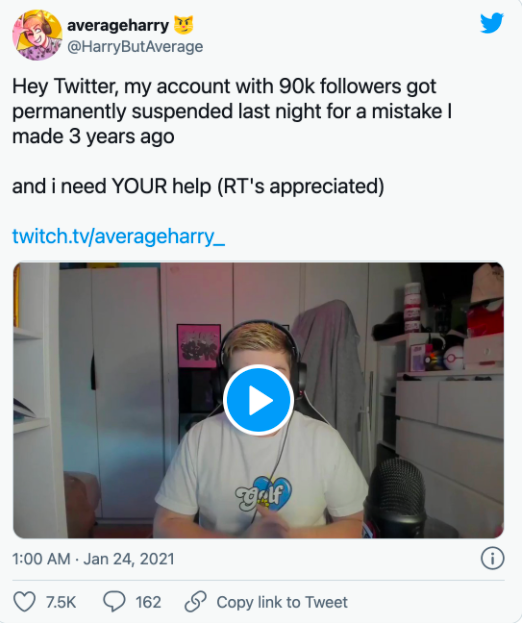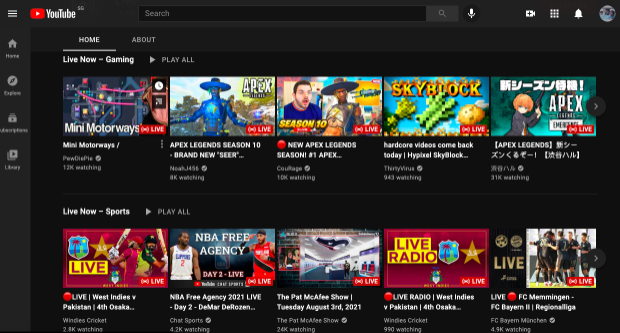The Underlying: Going Live in 3, 2, 1…
Online danger is inevitable and protection for youths should be prioritised. Nur Sabrina and Ray Lim delve into the world of online streaming.
AverageHarry asks for help when his Twitch account gets banned. Photo taken from AverageHarry’s Twitter.
BY
Ray Lim
Places Section Editor
Hype Issue #53
Nur Sabrina
People Section Editor
Hype Issue #53
Published on
Aug 13, 2021
Are conventional streaming services like Twitch exploiting underaged streamers on their platform?
In this day and age of internet streaming, the popular streaming service Twitch has grown and became a massive online social media platform. Even though they have guidelines that restrict people under the age of 13 from streaming, how effective are these measures and why are they really necessary?

AverageHarry asks for help when his Twitch account gets banned. Photo taken from AverageHarry’s Twitter.
For example, AverageHarry, 15, created his Twitch account two months before his 13th birthday. He regularly streams gaming content, often conducting charity streams where the profits generated from donations goes to a charity of his choice. He was banned by Twitch after streaming for two years and having gained 90,000 followers for the sole reason that his account was created before he turned 13 officially.
The issue falls in the grey area where AverageHarry was not officially 13 when he created his account, but yet, Twitch only took action two years after the violation was made, when the streamer had already passed the age requirement according to their terms of services.
A Twitch representative said in a statement to e-sports consultant Rod “Slasher” Breslau: “We don’t allow children under 13 to register for Twitch accounts, and we’ll take enforcement action if we’ve found that they’ve done so in violation of our terms of service.”
This scenario raises the question of how the streaming services conduct their quality control in accordance with their terms and services, as there was major backlash from the Twitch community when the incident occured.
Twitch, whether knowingly or unknowingly, allowed an underage streamer to produce content for their site, and only took action when his channel gained presence in the larger streaming community.
Who is responsible for keeping minors safe online?
Although there are age restrictions in place on Twitch, a 2020 article by Wired reveals the alarming number of underaged children streaming on Twitch. It was seen how children as young as 10 were receiving inappropriate comments on their lives, mainly from adults. This just proves how many predators are out there preying on young children, taking advantage of their lack of maturity and understanding.
Apart from content creation by minors, content consumption may also pose a danger. At the end of the day, most of the content online cannot be controlled. Online streaming videos usually have an age rating, deeming whether certain content is suitable for the younger audience. However, parents can monitor their children who are live-streaming.
It is not uncommon for kids under the age of five to be walking around with an iPad or begging for their parents’ phones. Though there are some who debate about the age a child should be given a smartphone, we cannot disagree that a phone is considered an essential in our everyday lives. Mobile phones allow parents to keep in touch with their kids while they are at school or with friends. In the event where something happens, reaching out to their parents is made easier with a few clicks.
However, with the ease of these ‘few clicks’, it also means that our children have easy access to mature content which is not suitable for them. Children may also pos content of themselves without being aware of the dangers of it.
It is the responsibility of parents and guardians to monitor what their children watch and do on the Internet. In this day and age, our society is so fast-paced and technologically advanced. Children grow up with gadgets, as if it is in their nature to understand how these things work. Allowing children to explore their creativity by creating content is not wrong, but adult supervision should be mandated.
Keeping minors safe
There are many ways for parents to make the Internet a safer place for their children. Things as simple as keeping screens and devices where you can see them and knowing your parental controls can make a large difference.
In AverageHarry’s case, we can see how Twitch had failed to detect a minor and only took action two years later, when they had already gained profits from his actions. But is Twitch the only platform that has allowed something like this to occur? What about other social media platforms that allow live-streaming?
TikTok
TikTok (in most regions) has ensured that those below 16 cannot do livestreams and by right, videos posted by anyone below 16 should not enter the ‘For You’ feed. The rules may seem strict because TikTok has made it clear that they are very committed to ensuring the safety of minors on their platform.
Thus, it is crucial that parents ensure that their children are honest when signing up to allow platform guidelines to protect them. Anyone below the age of 16 going live can be reported and their streams would end immediately.
Youtube
For YouTube, children under the age of 13 are not allowed to stream unless an adult is physically present in the stream. Anyone not following the guidelines will have their streaming sessions ended. If an account persistently goes against the rules, their account will be terminated.

Live videos are always easily available on multiple platforms. Photo taken from YouTube.
Ensuring safety for minors, both content creators and content consumers, is not solely the responsibility of parents. It is a community effort. It is undeniable that parents play a major role in their children’s safety on the Internet.
However, with the help of other online users, we can all ensure that children are not exposed to inappropriate content and comments. It is up to us to report accounts which violate guideline rules. Together, we can make the Internet not only safer, but more educational and purposeful for everyone, no matter the age.

deep sleep
winter relaxing jazz music
smooth piano jazz
… [Trackback]
[…] Here you will find 47531 more Information to that Topic: hypesingapore.com/index.php/2021/08/14/streaming-and-its-inevitable-danger/ […]
… [Trackback]
[…] There you can find 76491 more Information on that Topic: hypesingapore.com/index.php/2021/08/14/streaming-and-its-inevitable-danger/ […]
… [Trackback]
[…] Info to that Topic: hypesingapore.com/index.php/2021/08/14/streaming-and-its-inevitable-danger/ […]
… [Trackback]
[…] Find More on that Topic: hypesingapore.com/index.php/2021/08/14/streaming-and-its-inevitable-danger/ […]